Jan Smuts and the Anglo-Irish Truce of July 1921
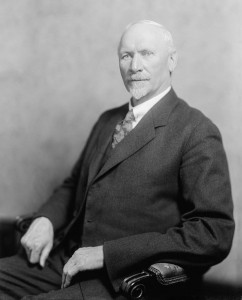
Jack Traynor
Jan Smuts, a one-time Boer general turned South African statesman and British diplomat, made a dramatic intervention in Ireland in 1921. His role helped to bring about the truce of July 1921 that ended hostilities between the IRA and British forces in the Irish War of Independence.
A convergence of international and domestic events influenced the advent of the Anglo-Irish Truce in July 1921. In a 2021 article published on The Irish Story as the centenary marking the truce approached, the intervention of the South African statesman Jan Smuts in encouraging and helping to broker the truce was highlighted.
This article examines how Smuts’ role helped to steer British policy on Ireland towards considering formal negotiations with the Irish republican leadership. It explains how republicans attempted to utilise the South African premier’s considerable influence to bring about a negotiated end to the War of Independence.
Jan Smuts, a one-time Boer general turned South African statesman and British diplomat, made a dramatic intervention in Ireland in 1921.
Paris Peace Conference
The inaugural meeting of the revolutionary Dáil Éireann on 21 January 1919 saw the formal adoption of the ‘Message to the Free Nations of the World’, which proclaimed optimism ‘at the dawn of the promised era of self-determination and liberty’ that their ‘complete independence as an Irish Republic’ would be achieved.[1]
Irish republicans cannily attached their cause to the principle of self-determination, which was a zeitgeist of the immediate post-war era. In his ‘Fourteen Points’, American president Woodrow Wilson articulated his vision of a new liberal internationalism where the principle of self-determination would replace the traditional domination of larger nations over small ones.
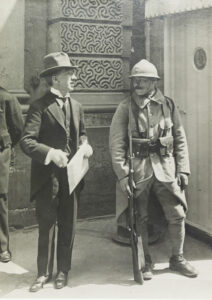
Wilson’s Secretary of State Robert Lansing was uncomfortable with using the phrase self-determination, as he believed it was ‘loaded with dynamite’ and would ‘raise hopes which can never be realized’ among small nations.[2]
These small nations, including the Irish, sent envoys to seek entry to the Paris Peace Conference. Seán T. O’Kelly led an Irish republican delegation to Paris, but like his counterparts from other parts of the world such as Egyptian nationalists of the Wafd Party, their attempts to receive entry were denied. Most of the small nations never received an official hearing.[3]
In Paris, the South African prime minister Jan Christian Smuts played a key role as an Allied negotiator. Smuts was an ardent supporter of Britain as a global power and had a keen interest in Irish affairs.
Before the conclusion of the First World War, he advised Irish nationalists not to pursue a strategy of appealing to the post-war peace conference, but instead to bring their case to ‘the highest court of appeal… the Imperial Conference.’[4]
Smut advised Irish nationalists not to pursue a strategy of appealing to the post-war peace conference, but instead to bring their case to ‘the highest court of appeal… the Imperial Conference
This reflected Smuts’ larger vision of the role to be played by Britain and the Commonwealth in the post-war world. He hoped to see the British Empire transformed from a mercantile empire based on subjugation into a new international order of co-operating autonomous dominions unified by a shared loyalty to the British crown.
Smuts’ worldview
Smuts had a complicated relationship with the British Empire in his early life. Whilst the young Smuts was Cambridge-educated and positively disposed towards Britain, the Jameson raid of 1896 (in which the British attempted to provoke a pro-British uprising in the Transvaal Republic) soured his initial enthusiasm for Britain.
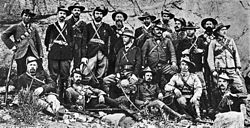
In the wake of the raid, he offered his services to the Transvaal republic as attorney general. During the Second Boer War (1899-1902), Smuts was associated with the ‘Bitter Enders’, hard-line opponents of Britain who refused to countenance surrender of the Boer guerrillas.
Dramatically, however in 1902, he reversed his position when he delivered a speech in the Gauteng town of Vereeniging, which appealed to his audience, ‘in the generous spirit of forgive and forget’, that peace should be found in ‘a stable commonwealth in South Africa, in which Boer and Briton will both be proud to be partners.’[5] It was a reversal of his wartime militancy and signalled his return a broadly pro-British outlook. This remained his worldview for the rest of his life.[6]
Smuts moved as a young man from Cambridge-educated Anglophile to Boer ‘bitter-ender’ to advocate for peace and reconciliation in South Africa under British rule.
At the turn of the century, the Boer war-effort became a romantic cause célèbre taken up by Irish nationalists, including separatists and Home Rulers. At Westminster, Irish Parliamentary Party MPs were staunch opponents of the Boer War and frequently raised issues like the treatment of civilian prisoners of war in South Africa. Irish solidarity with the Boers was also seen in the naming of several Gaelic Athletic Association clubs in homage to famous Boer generals, such as the Lahorna De Wets and the Carnew Krugers.
The war provided Irish nationalists with ‘an example of British oppression that paralleled their own, a proof that the whole British system was wrong.’[7]
When peace terms for the Boer War were published in 1902, John Redmond expressed his view that Ireland alone amongst the pro-Boer nations had scarified her own self-interest by alienating British public opinion.
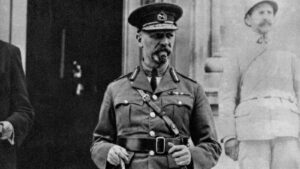
He then outlined his hope that the future of the Empire would be as a confederation made up of self-governing nations, including Ireland and South Africa.[8] This strongly echoed Smuts’ own ideas. The South African leader was grateful to the British for transferring to South Africa ‘her entire freedom under a Constitution which makes it possible for us to realise our own national ideals along our own lines.’[9]
Smuts’ pro-British worldview was underpinned by a deeper philosophical theory he elaborated in his 1926 treatise Holism and Evolution. In this book, Smuts argued that the British Commonwealth was inherently a progressive force for good in the world. He considered the Empire to be a ‘family of nations’ which were ‘far greater than any empire which has ever existed… We are a whole world by ourselves.’[10]
He hoped Irish nationalist demands for greater independence could be reconciled with his objectives for a reimagined imperial project. During the Irish War of Independence, Smuts tried to play the role of an honest broker and persuade Irish republicans to undergo a similar journey to his own.
Smuts argued that the British Commonwealth was force for good in the world and encouraged Irish nationalists to moderate their demands to Dominion status within the Empire.
When Éamon de Valera embarked on his tour of the United States in June 1919, Smuts recognised the potential global impact of the Irish revolution. He called it a ‘chronic wound’ which had ‘septic effects’ that were ‘spreading to our whole system’, particularly ‘through its influence on America’ where it was ‘beginning to poison our most vital foreign relations.’[11]
During the South African general election in 1920, Smuts warned that his Afrikaner nationalist opponents wanted to see ‘South Africa converted into a second Ireland.’[12]
His fear that the Irish revolution posed an existential threat to the whole British imperial system encouraged him to become involved in attempts to present an alternative vision to Irish nationalists of a self-governing role for (southern) Ireland within a rejuvenated British Commonwealth. He even believed the ‘crisis’ in Ireland could be used to accelerate the conversion of the pre-war British Empire into a ‘new experiment’ which would allow the dominions to act more ‘as independent nations.’[13]
Irish republican activities in South Africa
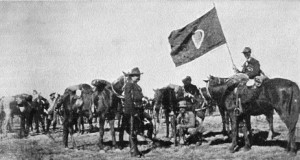
Like many Irish expatriates elsewhere, emigrants and diaspora Irish communities in South Africa were largely sympathetic towards Irish republicanism. An Irish Republican Association of South Africa was established and had ten branches nationwide at its first annual general meeting in February 1921.[14] By April, they reached 1,000 members and had doubled their number of branches.[15]
The Association mostly concerned itself with propaganda and lobbying. It published a fortnightly newspaper, The Republic, which was launched in the immediate aftermath of the death of Terence MacSwiney. J.J. Moran, an Irishman living in South Africa, recognised that the ‘heroic hunger-strike and death of the Lord Mayor of Cork strengthened the unity and determination of the Association.’[16]
Global interest in MacSwiney’s death in October 1920 helped to influence ‘global anti-colonial activism and thought’, according to Mannion and McGarry.[17] The Association noted that ‘in South Africa, as throughout the world, [MacSwiney’s] sacrifice has fired the imagination of the peoples.’[18] However, the Association’s activism remained relatively low-key until the arrival of two republican envoys in spring 1921.
Like many Irish expatriates elsewhere, emigrants and diaspora Irish communities in South Africa were largely sympathetic towards Irish republicanism and found allies among Afrikaner or ‘Dutch’ nationalists
In March 1921, Patrick Little and Colonel Maurice Moore were dispatched from Dublin to South Africa as republican envoys with a mission to ‘get Smuts to raise the Irish question at the coming Imperial Conference… so as to give Lloyd George a face-saving opportunity of bringing a truce.’[19]
Although tentative attempts to broker a truce under the mediation of Archbishop Clune of Perth had failed in December due to British insistence that the IRA decommission its arms, the effort signalled that a conclusion to the military phase of the War of Independence was in sight. General Macready, the British military commander in Ireland, felt that by early 1921 ‘peace was in the air’ and that the ‘cup-and-ball game between repression and conciliation’ would soon end.[20]
In Smuts the Irish sought an advocate who would use his position as a respected statesman to espouse ‘the cause of Ireland’ at June’s Imperial Conference in London and ‘obtain a settlement between the two nations favourable to the complete independence of Ireland.’[21] It was unrealistic to hope that Smuts would support British recognition of an Irish Republic. Patrick Little felt they could not expect much of Smuts, who had ‘turned [his] back on republicanism in [his] own country. How can [he] support it in Ireland?’[22]
De Valera’s strategy of approaching Smuts indicated his longstanding acceptance in principle of a compromise which would inevitably fall short of a full republic. In South Africa, Moore lobbied both Smuts and the opposition led by Afrikaner (or as they called them ‘Dutch’) nationalists. He found ‘the Dutch’ positively disposed towards to the Irish cause. Moore wrote that Smuts’ motivations for helping the Irish was threefold: firstly, because ‘the Irish have always helped the Boers in their struggle for freedom’; secondly, due to his ‘idealistic views of freedom for small Nations’; and thirdly, because ‘he may think (and I believe did think) it to the advantage of the British Empire.’[23]
Towards settlement negotiations
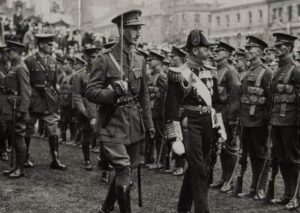
Whilst in London for the Imperial Conference in June, Smuts was heavily involved in drafting George V’s speech for the opening of the Northern Ireland Parliament. This speech was a key moment in the lead up to the truce and subsequent Treaty negotiations.
Frank Pakenham described the events as beginning with the arrival of ‘a draft speech’ from the government which the king thought ‘fell short of effective humanity’ and was not strong enough in its appeal for peace and reconciliation. As such, ‘Smuts was summoned privately, and a new draft was prepared.’[24]
The speech delivered by George V, with heavy input from Smuts, appealed ‘to all Irishmen… to forgive and forget, and to join in making for the land they love a new era of peace, contentment and good will.’[25] The speech strongly echoed Smuts’ speech of 1902. His biographer, W.K. Hancock, wrote, ‘Words that Smuts had written and spoken at Vereeniging [Peace Conference in 1902] were heard again in Belfast on 22 June 1921.’[26]
Smuts was deeply involved in bringing about the Truce of 1921 in Ireland, encouraging the British government to offer the Irish Dominion status.
Smuts encouraged the British government to use the king’s speech to ‘foreshadow the grant of Dominion status to Ireland and point out that the removal of all possibility of coercing Ulster now renders such a solution possible.’ Ronan Fanning identified the events of 22 June as a watershed moment which solidified partition but offered an olive branch to Irish nationalists.[27]
Mirroring British efforts to move towards a peace settlement, the Irish sought to use Smuts as an intermediary to encourage the British to negotiate. On 4 June, Art O’Brien wrote to de Valera suggesting that Tom Casement, the brother of Roger Casement, act as an intermediary to arrange a meeting between the republicans and Smuts. O’Brien described Casement as ‘a very intimate friend of Smuts.’[28]
Feelers were put out to Smuts. Upon learning of these overtures in the aftermath of the king’s speech, Lloyd George was ‘delighted’ and he felt ‘it was the very thing to follow up the King’s speech’. He thought Smuts ‘was the very man to do the job – no Englishman, an outsider, a Boer.’[29] De Valera was captured on 23 June and brought to Dublin Castle. Significantly, however, he was soon released and on 24 June an invitation was formally extended by the prime minister inviting the Irish republican president and James Craig, the Northern Irish premier, to attend talks in London. General Macready learned of this decision in London, recalling that ‘General Smuts was deputed to bring de Valera to reason.’[30]
On 5 July, Smuts travelled incognito to Dublin where he conferred with several key republican leaders including de Valera, Arthur Griffith, Eamon Duggan, and Robert Barton. The conference was strained. Smuts found the Irish intractable and difficult to deal with. De Valera and Smuts bickered over contentious issues such as partition and the republic. Smuts advised the Irish that Ulster was now ‘out of the way’, and a southern settlement was in sight.
Strongly opposed to Smuts’ carefree advocacy of partition, de Valera rebuked the South African leader and argued his ‘reading of history was hopelessly wrong.’[31] Smuts strongly advised the Irish ‘against a republic. Ask what you want, but not a republic.’ In private, Smuts was scathingly critical of the republican leadership, referring to them as ‘small men’.[32] When this condescending description was leaked and printed in the press, it created controversy and caused Smuts deep embarrassment. Even the former Home Rule leader Timothy Healy criticised Smuts for the remark: ‘No man is small who braves death for his country.’[33]
Despite the tempestuous meeting, Smuts left feeling he had made a positive impact. The invitation had been accepted on 24 June and a truce was then agreed on 8 July, which came into force on 11 July. Following brief talks between de Valera and Lloyd George in Dublin, an offer of dominion status was made on 20 July. The draft terms had been produced by Edward Grigg and ‘worked over by Chamberlain, Balfour, and Smuts.’[34] Smuts then wrote to de Valera urging him to accept the offer, although his letter was worded ‘in terms ill-suited to Irish pride’, according to Pakenham. Smuts pointed to the various nations already enjoying dominion status and patronisingly wrote ‘what is good enough for these nations is surely good enough for Ireland.’[35]
Smuts also erred when his detailed correspondence to Lloyd George was published in the press, which included his interactions and impressions of the Irish leaders (including his ‘small men’ remark). Republicans believed Smuts had broken confidentiality and acted improperly by disclosing details of their meetings while negotiations with Britain were still in train.[36] This marked the end of Smuts’ involvement in the negotiations which eventually would produce the Anglo-Irish Treaty in December.
Aftermath
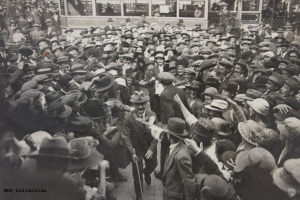
Smuts left England for South Africa on 5 August 1921. Republicans initially had high hopes that Smuts could be relied upon as a fair and level-headed intermediary to help them secure a truce. Although he played a significant role in bringing about the eventual truce, his tactless interactions with the Irish leadership soon brought his role to an abrupt end.
When Smuts published private correspondence, which included plans for the offer proposed on 20 July, de Valera saw this as a pernicious attempt to ‘appeal to the Irish people over or behind him’. This was likely an early effort to test the unity and cohesion of the republican movement. Nicholas Mansergh observed that after this piece of chicanery, ‘de Valera never forgave him and never trusted him again.’[37]
Smuts tried to persuade de Valera that Ireland’s participation in the Commonwealth would be worthwhile and would not diminish Irish prestige, but his appeals fell flat. According to Heather Jones, Smuts ‘completely underestimated the degree of anti-monarchism’ in Ireland.[38] There was also a significant feeling of anti-imperialism within Irish republicanism which saw the entire British imperial project as fundamentally unjust and morally bankrupt.
Smuts was hoped to be a key arbiter in as peace settlement but he deeply under-estimated the anti-monarchical and anti-imperialist sentiments among Irish republicans.
An example of this could be seen in an incident recorded by Robert Briscoe on 8 January 1922 during a late-night discussion between Briscoe, Liam Mellows, and Séumus Robinson. They discussed how they could best ‘carry on the fight against the Empire’ in the aftermath of the Treaty’s ratification. Robinson proposed they go to India ‘and teach the Indians all we have learned about guerrilla warfare and British tactics. With their vast population we’d have a chance to strike a real blow for freedom.’ Briscoe recalled there was ‘an outburst of genuine enthusiasm’ about the Indian idea, though it came to nothing.[39]
During the Dáil debates on the Treaty, South Africa was proposed as an international comparison for what Ireland’s future could hold. On 19 December 1921, Collins argued that Canadian and South African independence was ‘real and solid, and will grow in reality and force as time goes on.’[40]
Eoin O’Duffy, TD for Monaghan, referenced the Boers, who ‘had a Republic before the South African War’, yet were ‘beaten by force of arms and forced to submit to more humiliating terms than this Treaty offers us.’ He rhetorically argued it would not be considered dishonourable for the Boers, ‘if the opportunity offered’, to try to ‘secure back the Republic again.’ O’Duffy suggested that South Africa’s dominion status would in time allow the opportunity for the Boer republics to be re-established.[41]
On the anti-Treaty side, several speeches rejected pro-Treaty comparisons between Ireland and South Africa. Bryan Cusack, TD for Galway, told the Dáil that ‘the last British troops only left South Africa during the past four or five months’, suggesting that South Africa was less independent from British power than pro-Treaty deputies implied.[42] Erskine Childers, who had a great deal of first-hand knowledge of South Africa, was quick to refute the reality of the country’s reputed independence, lecturing deputies on the history of the federation of South Africa which ‘was given effect… by an Act of the British Parliament’, under which South Africa held its constitution.[43]
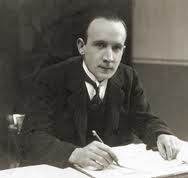
Smuts was a unique historical character who does not lend himself easy to parallels. But in Irish politics, Kevin O’Higgins and his political journey resembled several elements of Smuts’ own ideological development. In early independent Ireland, O’Higgins became increasingly disillusioned and dissatisfied with the results of the Irish revolution. Instead of bemoaning the Treaty for its obvious failure to achieve the much-vaunted republic, O’Higgins adopted a curious lament for ‘counter-factual home rule or dual-monarchy Irelands that had never come into being’, according to John Regan.[44]
During his political career as a senior cabinet minister in the Irish Free State, O’Higgins became attached to the idea of Ireland taking a leading role in the British Commonwealth. At the 1926 Imperial Conference, O’Higgins proposed a rejuvenated Commonwealth which respected ‘the autonomy of the dominion governments.’
Writing in May 1949, Smuts worried India’s independence as a republic and the Irish state’s leaving leave the Commonwealth would cause it to ‘go the way of the Holy Roman Empire, and become nothing but a name, and lose all meaning and reality.’
This proposal put forward by O’Higgins largely mirrored Smuts’ proposals at the 1921 Imperial Conference, which were not adopted at the time.[45] At the Imperial Conference in 1926 O’Higgins went on a solo run, advocating a sweeping reactionary programme of ‘dual monarchy’ in exchange for Irish unity.
His plans included a ‘more reasonable line’ on the Irish language (in other words, dropping mandatory language requirements for civil servants and curtailing language education), accepting a visual representation of the king on Irish coinage, replacing the Irish tricolour flag, holding a separate coronation of the British king as ‘King of Ireland’ in Dublin, and appointing Charles Vane-Tempest-Stewart, Lord Londonderry, as viceroy of Ireland.[46] The assassination of O’Higgins in 1927 put paid to such schemes. Comparisons between O’Higgins and Smuts are worth exploring further, as they reflect the interplay between developing national consciousness and broader imperial identities.
In 1924, Smuts lost power as prime minister in South Africa to the Afrikaner nationalist party led by General JBM Hertzog. Smuts’ dismissive attitude to the republican aspirations of Afrikaners has been compared to his dismissal of de Valera’s opposition to dominion status as parochial.[47] Smuts remained a thoroughgoing ally of British imperialism in opposition, with his party attracting the support of many English-speakers. Hertzog and Smuts agreed a political rapprochement in 1934, which prompted a hard-line wing of Afrikaner nationalists to split from Hertzog’s movement.
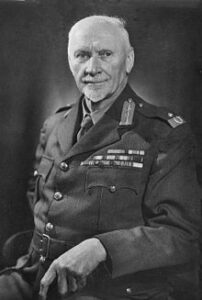
In the immediate aftermath of the outbreak of World War II, Smuts narrowly succeeded in persuading the South African parliament to enter the war on the side of the Allies. Hertzog resigned as prime minister, having favoured neutrality, which led Smuts to return as South Africa’s leader on 5 September 1939. In 1948, Smuts’ United Party lost that year’s general election to the hard-line Afrikaner nationalists led by DF Malan. Smuts even lost his own parliamentary seat, a personal humiliation. The National Party government instituted the notorious policy of apartheid, which endured until 1994.
Towards the end of his life, Smuts wrote to Churchill in November 1948 to advise that the Attlee government should not ‘punish’ Ireland for its ‘folly’ of cutting ties with the Commonwealth.[48]
Smuts tracked the developments of Indian independence, particularly its creation of a republic but continued membership of the Commonwealth, which mirrored de Valera’s favoured nostrum of external association. Writing in May 1949, Smuts expressed a worry that India’s constitutional realignment and the recent Republic of Ireland Act 1948 may leave the Commonwealth to ‘go the way of the Holy Roman Empire, and become nothing but a name, and lose all meaning and reality.’ He was particularly concerned that ‘what has happened in Ireland may now be repeated in South Africa.’[49]
Smuts died in September 1950. Ten years later, South Africa voted in a (whites only) referendum to establish a republic, cutting its last ties with the British Commonwealth.
References
[1] ‘Message to the Free Nations of the World’, 21 January 1919, (eds. Ronan Fanning, Michael Kennedy, Dermot Keogh, Eunan O’Halpin), Documents on Irish Foreign Policy: Volume 1, 1919-1922 (Dublin, 1998), p. 2.
[2] Robert Lansing, The Peace Negotiations (London, 1921), p. 87.
[3] Erez Manela, The Wilsonian Moment: Self-Determination and the International Origins of Anticolonial Nationalism (Oxford, 2007), p. 59.
[4] Liam de Róiste witness statement, Irish Military Archives (IMA), Bureau of Military History (BMH), WS1698.
[5] Quoted in Bruce Nelson, Irish Nationalists and the Making of the Irish Race (Princeton, 2012), p. 167.
[6] Thomas Pakenham, The Boer War (New York, 1979), pp. 36-9.
[7] Aaron Linderman, ‘Afrikaner Influence on the IRA and SOE’, Securing Africa: Local Crises and Foreign Interventions (Oxford, 2013) (eds. Toyin Falola & Charles Thomas), p. 42.
[8] Dermot Meleady, John Redmond: The National Leader (Sallins, 2014), p. 31.
[9] Alan Paton, South African Tragedy: The Life and Times of Jan Hofmeyr (New York, 1965), p. 43
[10] Nelson, Irish Nationalists and the Making of the Irish Race, p. 169.
[11] The Nationalist (Tipperary), 19 July 1919.
[12] Evening Echo, 20 January 1920.
[13] Evening Herald, 27 May 1921.
[14] Department of Foreign Affairs Report, 10 August 1921, (National Archives of Ireland (NAI), Dáil Éireann series files (DE) 4/4/2).
[15] Report by Patrick Little, 14 April 1921, (NAI, DE 2/526).
[16] J.J. Moran witness statement, IMA/BMH/WS1492.
[17] Patrick Mannion & Fearghal McGarry, The Irish Revolution: A Global History (New York, 2022) p. 21.
[18] Irish Examiner, 7 December 1920.
[19] Patrick Little witness statement IMA/BMH/WS1769.
[20] Nevil Macready, Annals of An Active Life Volume II (London, 1924), p. 542.
[21] Maurice Moore to Dáil Éireann, April 1921, (Éamon de Valera papers, University College Dublin Archives, P150/1450).
[22] Report by Patrick Little, 14 April 1921, (NAI, DE 2/526).
[23] Maurice Moore to Dublin, 21 April 1921, (NAI, Department of Foreign Affairs, Early Series, Box 32, File 233).
[24] Frank Pakenham, Peace by Ordeal (London, 1935), p. 77.
[25] Freeman’s Journal, 30 June 1921.
[26] W.K. Hancock, Smuts: Fields of Force 1919-1950 (Cambridge, 1968), p. 54.
[27] Ronan Fanning, Fatal Path: British Government and Irish Revolution 1910-1922 (London, 2013), pp. 257-8.
[28] Art O’Brien to Éamon de Valera, 4 June 1921, (NAI DE 2/526).
[29] F.S. Crafford, Jan Smuts: A Biography (New York, 1943), p. 188.
[30] Macready, Annals of an Active Life, p. 569.
[31] Thomas Jones, Whitehall Diary Volume III (London, 1971), (ed. Keith Middlemas), pp. 83-4.
[32] Nelson, Irish Nationalists and the Making of the Irish Race, pp. 170-1.
[33] Pakenham, Peace by Ordeal, p. 87.
[34] Jones, Whitehall Diary Volume III, p. 91.
[35] Pakenham, Peace by Ordeal, p. 86.
[36] Ockert Geyser, Jan Smuts and His International Contemporaries (Gauteng, 2001), p. 153.
[37] Nicholas Mansergh, Nationalism and Independence: Selected Irish Papers (Cork, 1997), (ed. Diana Mansergh), p. 190.
[38] Heather Jones, ‘War, Dominions, and Monarchy: The Transnational Imperial Context of Ireland’s Revolution 1916-22’, in The Irish Revolution: A Global History, p. 273.
[39] Robert Briscoe, For the Life of Me (London, 1958), p. 141.
[40] Dáil Éireann parliamentary debates, 19 December 1921.
[41] Dáil Éireann parliamentary debates, 4 January 1922.
[42] Dáil Éireann parliamentary debates, 4 January 1922.
[43] Dáil Éireann parliamentary debates, 14 December 1921.
[44] John M. Regan, The Irish Counter-Revolution 1921-1936 (Dublin, 2001), p. 87.
[45] John P. McCarthy, Kevin O’Higgins: Builder of the Irish State (Dublin, 2006), pp. 234-5.
[46] Deirde McMahon, ‘The 1926 Imperial Conference and Kevin O’Higgins’s proposals for a dual monarchy’, Analecta Hibernia, 44, (2013), p. 104.
[47] Kenneth Ingham, The Conscience of South Africa (New York, 1986), p. 128.
[48] Smuts to Churchill, 25 November 1948, quoted in (ed. Jan van der Poel), Selections from the Smuts Papers Vol. VII (Cambridge, 1973), p. 269.
[49] Smuts to Churchill, 21 May 1949, quoted in Smuts Papers, pp. 296-7.